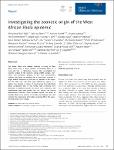Investigating the zoonotic origin of the West African Ebola epidemic
Saéz, Almudena Marí
Weiss, Sabrina
Nowak, Kathrin
Lapeyre, Vincent
Zimmermann, Fee
Düx, Ariane
Kühl, Hjalmar S.
Kaba, Moussa
Regnaut, Sebastien
Merkel, Kevin
Sachse, Andreas
Thiesen, Ulla
Villányi, Lili
Boesch, Christophe
Dabrowski, Piotr Wojtek
Radonić, Aleksandar
Nitsche, Andreas
Leendertz, Siv Aina J.
Petterson, Stefan
Becker, Stephan
Schaade, Lars
Fahr, Jakob
Gogarten, Jan F.
Calvignac-Spencer, Sébastien
Leendertz, Fabian
The severe Ebola virus disease epidemic occurring in West Africa stems from a single zoonotic transmission event to a 2‐year‐old boy in Meliandou, Guinea. We investigated the zoonotic origins of the epidemic using wildlife surveys, interviews, and molecular analyses of bat and environmental samples. We found no evidence for a concurrent outbreak in larger wildlife. Exposure to fruit bats is common in the region, but the index case may have been infected by playing in a hollow tree housing a colony of insectivorous free‐tailed bats (Mops condylurus). Bats in this family have previously been discussed as potential sources for Ebola virus outbreaks, and experimental data have shown that this species can survive experimental infection. These analyses expand the range of possible Ebola virus sources to include insectivorous bats and reiterate the importance of broader sampling efforts for understanding Ebola virus ecology.
No license information

